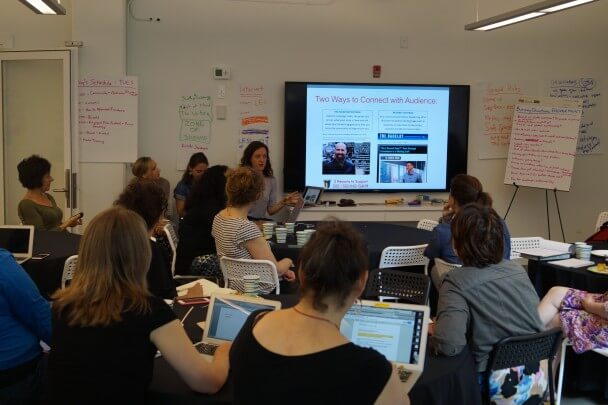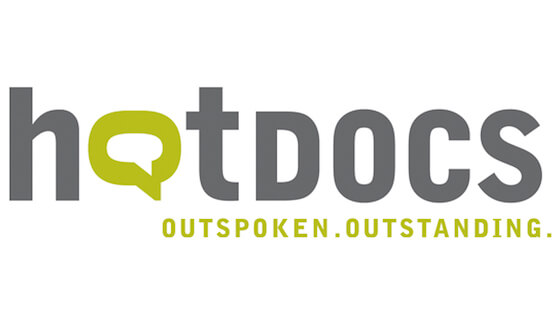Ten Nest-supported films at Hot Docs 2018!
Showcasing over 200 films and hosting over 200 thousand people each year, Hot Docs Canadian International Documentary Festival is North America’s largest documentary film festival. Chicken & Egg Pictures is excited to announce that ten Nest-supported films will be gracing this year’s line-up!
The 2018 Hot Docs festival will run April 26-May 6 in Toronto. You can view the schedule here and purchase festival passes and packages here.
Blowin’ Up, directed by Stephanie Wang-Breal
Roll Red Roll, directed by Nancy Schwartzman
Recovery Boys, directed by Elaine McMillion Sheldon (2017 Breakthrough Filmmaker Award Recipient)
The Devil We Know, directed by Stephanie Soechtig and Jeremy Seifert (co-director)
The Feeling of Being Watched, directed by Assia Boundaoui (2015-16 Accelerator Lab)
A Thousand Girls Like Me, directed by Sahra Mani (2016 Diversity Fellow Initiative)
United Skates, directed by Dyana Winkler and Tina Brown (2016 Diversity Fellow Initiative)
Tree, directed by Milica Zec and Winslow Turner Porter
Warrior Women, directed by Christina King and Elizabeth Castle (2017 Diversity Fellows Initiative)
On Her Shoulders directed by Alexandria Bombach (2018 SXSW LUNA / Chicken & Egg Pictures Award recipient)
***
In addition to the Nest-supported films that will be screening at the 2018 Hot Docs Festival, keep an eye out for the following films by directors whose work Chicken & Egg Pictures has supported and recognized in the past.
Grit directed by Cynthia Wade (Freeheld, 2007 and 2008) and Sasha Friedlander (Mudflow, 2013)
Inventing Tomorrow directed by Laura Nix (2018 Breakthrough Filmmaker Award recipient)
Skywards directed by Eva Weber (Black Out, 2007)
And a special shout out to Barbara Kopple (2011 Chicken & Egg Pictures Celebration Award) who has a few films playing at Hot Docs!
Chicken & Egg Pictures wants to wish these Nest-supported films and filmmakers luck with their participation in the Hot Docs Forum on May 1st and 2nd of the festival.
Born In China directed by Nanfu Wang and Lynn Zhang
The Rashomon Effect directed by Lyric Cabral
Nobody Loves Me, directed by Farihah Zaman and Jeff Reichert, co-directores of the Nest-supported documentary Remote Area Medical.
Congratulations everyone!
Post by 2018 Spring Programs Intern Dinayuri Rodriguez.
Mentorship Selects: How to follow up
Programmers and executives from HBO, Candescent Films, POV, and IFP shared their favorite ways filmmakers follow up:
Re-introduce yourself and your project.
Send a short email with where we met and a one page sheet with all the info about your film.
If you send a link, make sure it’s downloadable and easily accessible.
If it can’t be downloaded for security reasons, explain and ask how many DVDs you should send. Make sure your link has a very easy password so people don’t get frustrated opening it.
Know when to give them some space.
Send another quick email if you don’t hear back but back away after 3 follow-up emails.
Be nice.
If you see the programmer or executive, be friendly. Don’t tell them they didn’t respond or remember you. If they can’t help you personally, they still can be a friend to the project by connecting you with other people who can help you, so keep the lines of communication open and courteous.
Mentorship Selects: How to give confident and compelling interviews
Many filmmakers prefer working behind the camera, not in front of it, but talking about your film on TV, radio, and on panels provides enormous exposure for your film and the issues it tackles. Filmmaker Jessica Devaney and publicist Adam Segal of The 2050 Group joined our New York mentorship to shed some light on media presentations and dispel some common fears around media interviews.
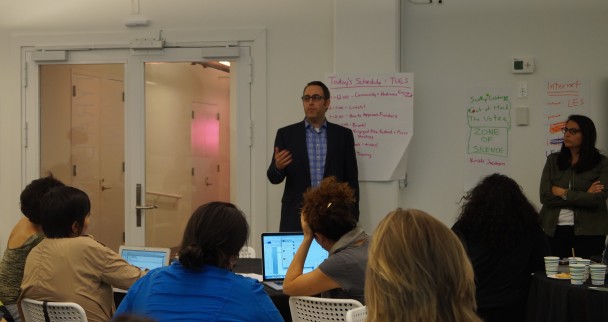
Here are their tips for giving your best media interviews:
Tell the story you want to tell.
Remember: as a filmmaker you are a storyteller, not a pundit. In media scenarios you are in charge of the story you present and you can direct the conversation toward what you want people to know about your film. Don’t just answer the questions. Ask yourself: what sentence do I need to say for this to be successful? Make sure you don’t get up till you say that sentence.
Be accessible.
Avoid jargon or overly technical vocabulary; don’t alienate your audience with big words or phrases they might not understand. Neutralize distracting physical tics like touching your hair or fiddling with jewelry.
Do your homework.
Talk to the producer and find out what they’re going to ask you. Look up when they last interviewed someone like you or talked with someone on your topic (via tracie). Observe what kinds of questions they asked or what angle they took.
Keep a cool head.
If you are a person who gets worked up, practice talking about hot button issues without losing your cool. If you make a mistake or say some wrong information, correct it before someone else does.
There’s strength in numbers.
If you want to take the focus off yourself, bring one of your subjects in the film with you.
Make sure your assets and materials are versatile.
Put together clips and assets that can be reused in different settings or shared in a different context.
Mentorship Selects: 7 tips for pitching your film
With the help and guidance of our guest experts and industry friends, we’ve put together this list of our 7 tips to keep in mind when you are pitching your film or project.
Practice, practice, practice.
Pitching is like a performance. If you’re prepared, you will feel and appear more relaxed.
Don’t repeat everything that is in your trailer.
Use every opportunity to share new information about your project.
Accept the feedback and any criticism you get.
Don’t waste time trying to argue; say thank you and hold back defensiveness.
Match your presentation to the tone of your film.
If it is a serious topic, reflect that in your voice. If it if it is light match that.
Let the images speak for themselves.
Explain the compelling story, not the style. It’s hard to explain style and tone.
Do your research.
Know who you are speaking with and familiarize yourself with their interests and passion issues. Take notes so that when they follow up with you, you can show growth.
Know the landscape.
If you pitch something that sounds like something a distributer has already done, immediately distinguish it. Be humble; don’t say “my film is better;” say that your film “builds on these others because…”
Mentorship Selects: Community screenings as a tool for engagement and impact
Caitlin Boyle of Film Sprout joined us to talk about how she sees community screenings as a vehicle for social change. She used her work on Diana Whitten’s film Vessel, a Chicken & Egg Pictures grantee and member of our Reel Reproductive Justice cohort, as a case study of how screenings can activate communities on an issue; in this case, abortion access.
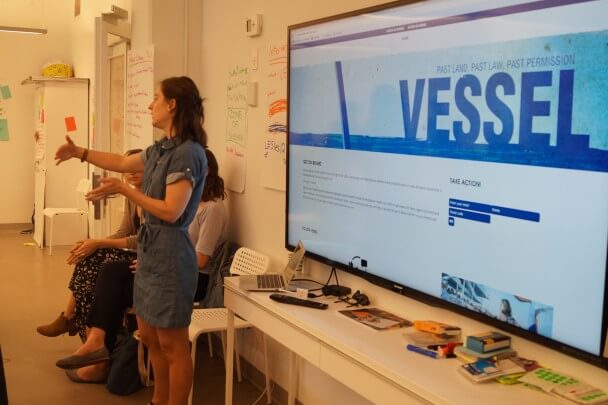
Here are her strategies for using community screenings to create engagement around your film:
The filmmaker and partners should set goals for what each screening should accomplish.
In some places, Vessel screenings collected ticket fees to fund abortion access, while in areas with limited or no abortion access, bringing the film for free was paramount.
Use the calendar to give the campaign an arc.
For the Vessel screenings, Caitlin utilized the Roe v. Wade anniversary and International Women’s Day to plan special events and incentivise screenings during those days.
Align metaphors in movie with engagement campaign.
For the Vessel screenings, the engagement campaign used metaphors like “going into uncharted waters” to market the events.
Think outside the fee.
Not every group can pay screening fees but you can barter free screenings for translations into other languages and retitling or subtitles, which will help the film reach more places.
Make sure engagement happens offline as well as online.
There was a large audience for Vessel in pro-choice 60-80 year olds who might not be on facebook or using email. Use digital platforms, but remember to make calls to reach your audience.
Survey screening hosts to get feedback, metrics and understand impact.
Send your survey a few weeks after and keep it short, about 15 questions.
Mentorship Selects: Are you my audience? Connecting your film with new communities
Sara Kiener, co-founder of Film Presence and audience engagement expert, begins her outreach campaigns with one essential question: Why are you making this film?
Once you can identify the reasons you are making the film and why it matters, she says, you can can find your audience from there.
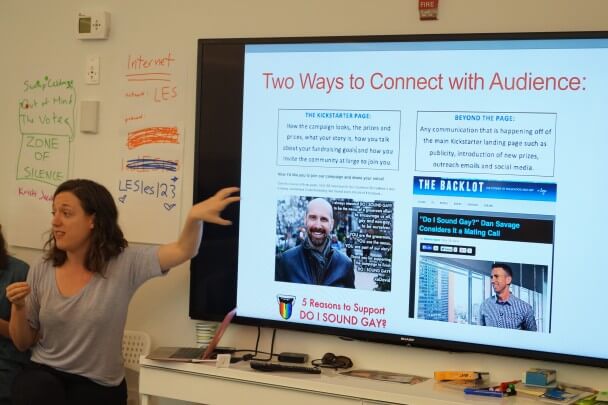
Here are her suggestions for creatively connecting with new audiences:
Don’t limit yourself to two or three audience groups, when you could go after twenty.
It’s not always easy to predict which groups will be interested in the film, so it’s best to cast a wide net when reaching out to partners. For example, while working on the outreach campaign for Do I Sound Gay?, she connected with anti-bullying organizations, fans of David Sedaris and Dan Savage (both men are featured in the film), This American Life listeners who are familiar with Sedaris from the radio program, and speech therapists interested in the topic of voice, and many more organizations and individuals who could link the film to new audiences.
When you first reach out, don’t ask for money right away.
Start with building a relationship and see how they might be able to help you. An organization might be interested in sharing your posts on social media or sending information about your film around in their circles.
Get personal on social media!
Show pictures from the process of your film being made. Put a quote on top of a picture to make an easy to share post about your film. Ask celebrities who care about the issues in your film to share posts or pictures of themselves in connection to the film.
